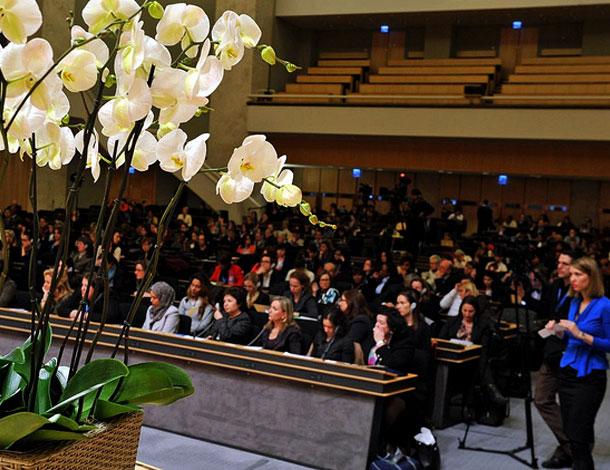With the global surge to the right and the attacks on civic space, many hope that powerful corporations can be allies for the civil society. Among them, the panelists of “The Business Case for Civic Space”, a public event organized by CIVICUS, on 14 June 2017, in the headquarters of the United Nations Human Rights Council in Geneva. The panelists included high level UN leadership and a Microsoft representative.
For us in AWID, participating in the panel was a chance to remind the audience that corporate human rights abuse is deeply gendered.
Women, immigrants, and communities in the Global South, are disproportionately affected by negative impacts of corporate activity, from exploitative working conditions and forced displacement to the contamination of land and water. And, as AWID and WHRDIC’s participatory research with Women Human Rights Defenders confronting extractive industries demonstrates, women are also the first to resist corporate power and defend rights and justice.
Feminists are great at making spot-on connections. When our feminism is intersectional, we understand how social power operates at the intersections of gender, race, class, sexuality, dis/ability and other axes. Our analysis of patriarchy cuts across dimensions of society, economy and politics. Our analysis of the private sphere has forever re-defined the personal as political.
So what is the connection to make here?
When we are speaking of shrinking civic space and look up to transnational corporations as potential allies, we forget that the ring-wing-corporate bond is one of the reasons for the shrinking of civic spaces, the rise of fundamentalisms and the backlash on women’s rights.
Earlier this year, giant tech corporations like Amazon, Facebook and Google appealed against Trump’s travel ban on a number of Muslim countries. They cited business concerns, such as recruiting international talent and competing with overseas companies. It is difficult to say with such a short time perspective, but this might well have been a landmark for transnational corporations collectively positioning themselves on the side of human rights. Or so it seems.
Corporations opposing extremism of the right - why is this a problem? Because the travel ban itself is a result of corporate takeover over U.S. presidency.
To quote the author and journalist Naomi Klein, “there have been presidents with business interests before. But there has never been a fully commercialized global brand as a sitting U.S. president.”
The rise of the right is inherently tied to the unfettered corporate power.
The corporate capture of political processes - at national and international levels - aligns these processes with the interests of economic elites. The Corporate Capture project details how this actually works, from community manipulation to economic diplomacy and judicial interference. Business interests may accidentally coincide with human rights and progressive agendas, as in the case of the travel ban, but more often they do not.
The deal corporations offers us as civil society is human rights and even women’s rights, as long as it is profitable for the corporations. Where rights and justice contradict business interests and increase costs - from improving environmental standards to addressing gender pay gap - the problems begin. Consider Google arguing it is too expensive for them to produce gender-segregated wage data. bell hooks explains eloquently the problem with feminism in a corporate world committed to capitalism, white supremacy, and patriarchy. Now, I am no business mogul, but this doesn’t seem like a very good deal to me.
We often get a similar argument about gender and workplace discrimination: women’s rights are good for business. This appears to be a strategic choice: to speak to businesses in a language they understand. In effect, we are contributing - unwillingly perhaps - to the business language becoming the most powerful language; and the logic of profit becoming the most powerful logic of our societies. We are pressured to justify human rights and gender justice in terms of productivity and profitability, of cost-effectiveness, of “good for business”.
Can’t transnational corporations play a role in protecting rights and providing the financial resources essential for the international human rights system to function? Why not. Paying taxes could be a start. Tax justice is a feminist issue. A week ago, news24 reported that alleged “fraud in the mining sector since 1998 has cost Tanzania 75 billion euros ($84 billion)”. This is just one sector in one country, and yet - imagine all this money going to development and women’s rights.

Unlike tax money distributed by governments, direct corporate funding allows corporations a foot in the door at inter-governmental spaces. A month ago, Microsoft and the United Nations announced a $5 million grant from Microsoft to the UN Human Rights Office. An unprecedented donation from a private company. In response, civil society and several states expressed concern, and called on the UN to reject the contribution in order to maintain its independence. Our opposition may not reverse UN decision, but it makes clear that corporate presence in the UN is not in consensus.
There’s momentum in international human rights spaces for multi-stakeholder dialogue.
Civil society is expected to engage with transnational corporations. However, let us be cautious of the context in which any such engagement takes place: a context of overwhelming corporate impunity and little to no accountability for human rights abuses.
We are yet to create instruments and institutions capable of holding transnational corporations accountable. Existing tools, such as the Guiding Principles on Business and Human Rights, are voluntary and limited, particularly regarding transnationals operating across national borders. To this end, one promising journey AWID has joined is the struggle for a legally binding treaty on transnational corporations and human rights. In reality, we have just begun to comprehend the unimaginable scope and depth of corporate power, and its control over our natural resources, labour, and information.
